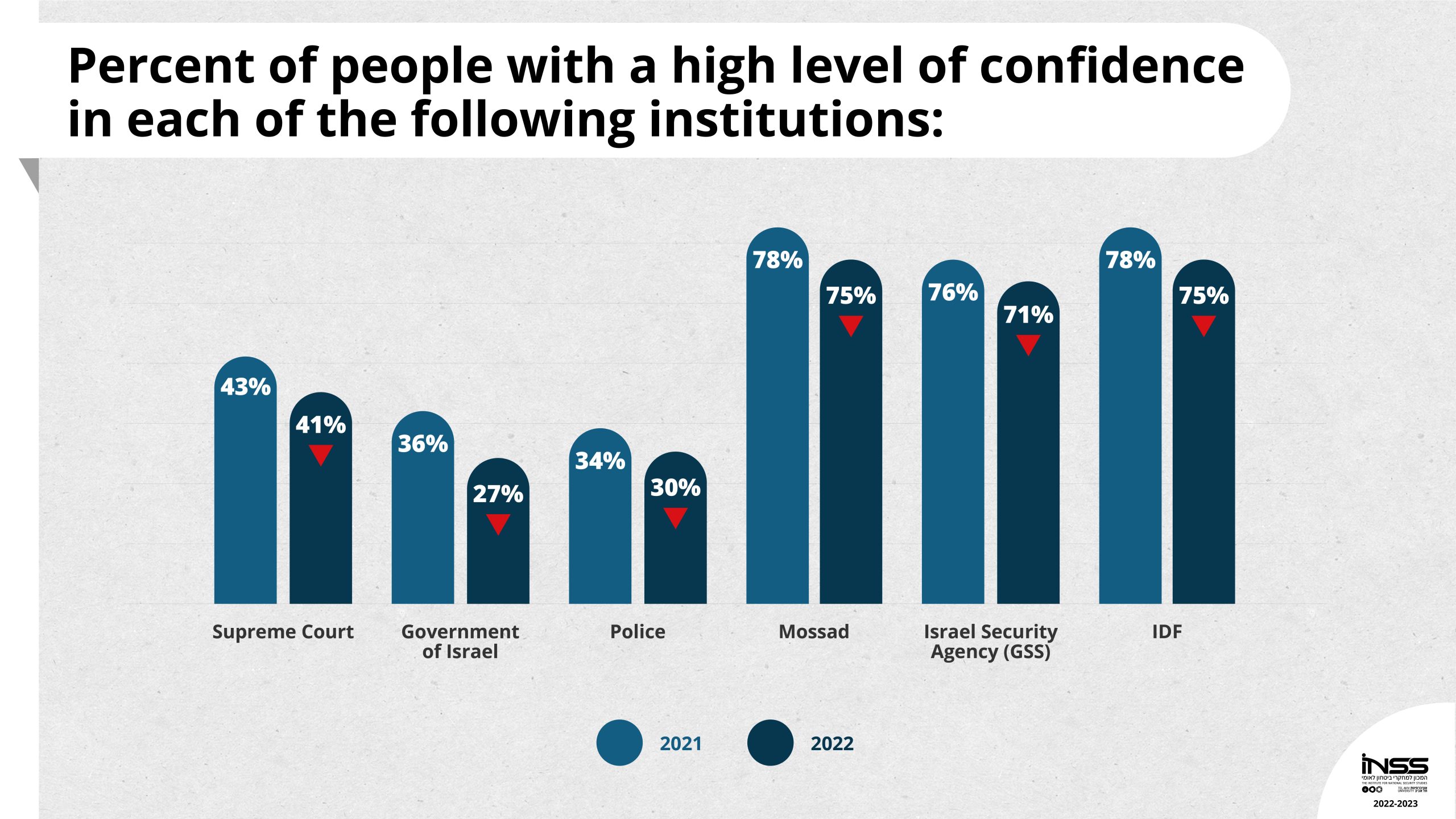Publications
INSS Insight No. 1692, February 27, 2023
The government of Israel should understand that proceeding with the proposed judicial initiative, which is undermining internal solidarity, damaging public trust in the government, and impairing governance, may well harm social resilience and consequently jeopardize Israel’s national security. Even if the government is determined to proceed with reforming the justice system, it should do so with caution and responsibility, based on broad public consent and in a way that does not entail harmful societal consequences.
Israel currently finds itself in the throes of a severe and protracted multidimensional sociopolitical crisis. It is rooted in the deep rift between opposing groups and worldviews on various fundamental issues, boiling down to questions relating to the nature of the state as both Jewish and democratic and the relationship between these two identities. Over the years, Israeli society and politics have succeeded, to some extent, in maneuvering between polarized interpretations of this ambiguous and charged concept, and in functioning – albeit not without difficulty – in a challenging atmosphere of social rifts and severe political disagreements.
The latest round of elections – the fifth in the past three years – ended with the victory of the right-wing bloc and the establishment of an ardently right wing coalition, with the ultra-Orthodox parties and the far right teaming with the Likud. This political amalgam has implications for several volatile issues, particularly with some government ministers championing extreme agendas that have major influence on the government’s stability and even survival. This situation further aggravates existing political controversies and consequently creates a sense of fear and threat among large groups of the Israeli public.
This is the backdrop to the strong, widespread public response to the government’s proposed changes to the judicial system, which would affect its independence and stature dramatically. This initiative is presented and regarded as a paradigm shift intended to engineer a revolution in the established system of balance between the three governing branches. To the initiative’s proponents, it reduces the excessive power usurped by the judiciary. To its opponents, the initiative gives uncontrolled governing power to the executive and legislative branches at the expense of the judiciary’s independence, authority, and powers. They argue that implementation of the government’s initiative as outlined will lead to a profound regime change in Israel and fundamentally alter the nature of Israel's democratic institutions.
As discussed elsewhere by INSS, harming the essence of democracy in Israel is liable to endanger national security, both internally and externally. In addition, the haste and stress characterizing the advance of the initiative and its opponents’ charge that it is also intended to serve the Prime Minister in his legal battle raise serious questions, spawn continuing and dramatic public protests, and engender highly emotional opposition in large segments of the Israeli public. Thus, according to recent surveys by Channel 12, 62 percent and 66 percent of respondents, respectively, said they support halting the process or delaying it to allow a national debate on its content. Just 24 percent and 21 percent, respectively, favored going ahead with the legislation as planned. Even among those who voted in the latest elections for coalition parties, greater numbers supported halting the process than proceeding with it.
How this crisis will play out remains unclear. It’s quite likely that in the end some sort of compromise will be reached, possibly based on the outline proposed by President Herzog on February 12. Yet it’s already possible to analyze the current crisis, which the President defined as placing Israel "on the brink of legal and social collapse." In this context, it is important to understand the possible repercussions of the governmental initiative and how it impacts the resilience of the state and national security.
Israel’s national resilience is based on three main pillars: social solidarity; the public's trust in the state’s institutions; and effective governance. These pillars are anchored in the assumption that Israel's strength – both its "hard" power (military, technology, and economy) and its "soft" power (diplomacy, including its relationships with Jewish communities around the world, and educational/scientific prowess) – is sound in current circumstances and in face of geopolitical threats, both existing and predicted. Hence, the nature of the changes proposed by the government and the depth of the current sociopolitical crisis must be explored, as well as their implications for Israel’s national strength – both in actuality and as it is perceived externally by friends and foes alike. This is significant, as already in recent years there has been a worrying erosion in the three pillars of resilience:
- Social solidarity: There seems a decline in the unifying ethos bonding the diverse groups of Israeli society, alongside an increase in the degree of hostility between them and an upsurge in the level of violence in the public space. This worrying trend has evolved with the Israeli ethos of social collectivism withering over the years and giving way to sectorial tribalism and growing individualism. This trend is clearly reflected in the Israel Democracy Index (Israel Democracy Institute, 2022), which points to a rather mediocre public perception (5 out of 10) of Israeli social solidarity over the last decade, which saw further decline in the last three years, from 5.5 to 4.7 (out of 10) among Jews and from 4.8 to 3.8 among Arabs. A survey by INSS (late October 2022) found that 61 percent of the Israeli public believe that the sense of solidarity has declined, with only 20 percent believing the opposite. These figures should be viewed as a baseline for the current crisis, which is likely to have a further negative impact on the social discourse in Israel and severely aggravate its internal divides.
- Public trust between the diverse social groups, between political parties and blocs, and toward government institutions is also in decline. This trend is particularly apparent with regard to the judicial system, where confidence in the system, according to INSS polls, has dropped markedly in recent years, from 64 percent of the public expressing strong trust in 2018, to 41 percent in 2022. The same holds for Israel Police (a drop from 53 percent public trust in 2018, to 30 percent in 2022). Israel’s successive governments have scored especially low levels of trust over the years, averaging about 30 percent of public trust over the last three years. The level of the public's trust in the IDF, the Mossad, and the Israel Security Agency is far higher, with a slight downward trend registered in the last year. It seems that overall, the crisis in public trust has now been aggravated further due to the socio-political upheaval, which reflects distrust in the motives of both sides.
- Governance, reflected in the public perception of how effectively the government carries out its duties in areas that are critical to the public, is also in decline. Thus, for example, the "sense of personal security" among large segments of the public is shrinking and the criticism of the agencies charged with enforcing the law is growing. A 2022 INSS survey showed a precipitous decline in the sense of personal security, as 57 percent stated that it had declined compared to just 6 percent who said their sense of security had increased. Moreover, governance has recently been challenged by the political system itself, to a degree that raises concerns about problematic performance by critical government ministries, such as the Ministry of Defense and the Ministry of National Security.

The academic consensus regarding national resilience suggests that high levels of solidarity, trust, and governance lead to robust resilience, which in turn enhances national capacities to cope successfully with severe disruptions, whether natural (such as earthquakes) or man-made (such as wars or terrorist attacks), in the following key areas: a) containing the unavoidable decline in performance following disruptions when they occur; b) preserving a measure of functional continuity, even during the disruption; c) rapid bouncing back from the disruption and returning to the previous level of functionality; and d) bouncing forward – i.e., attaining a higher level of systemic performance after the disruption, enabling national growth in multiple dimensions.
In the Israeli context, impeded national resilience might occur in the wake of a widespread disruption, whether a political, social, or economic crisis, a severe earthquake, or various internal or external security emergency scenarios. Israel’s national resilience undermined by the damage to its foundational components, reducing Israel's capacity to cope successfully with these challenges, contain them, recover from them quickly (relative to the gravity of the event), and even flourish. Hence the importance of reinforcing the components of national resilience in Israel from the perspective of national security.
The current public “earthquake” risks damaging national resilience further. The government of Israel needs to comprehend and internalize that processes of undermining internal solidarity, generating deep rifts and hostility between segments of the public, damaging the public's trust in the government, and weakening governance are all likely to incur a high price. Even if the government is determined to go ahead with changes to the judicial system, it must do so with caution and responsibility, in a way that allows sincere dialogue with the opposing camp and readiness for compromise. Such course of action is essential for halting the emerging deterioration of social resilience and the ensuing risks to the national security of the State of Israel.



